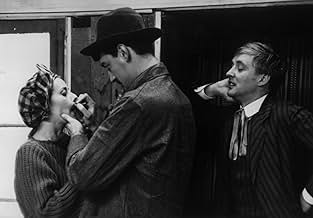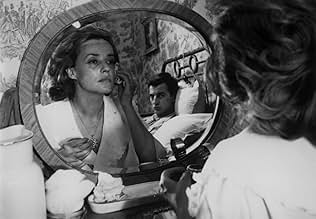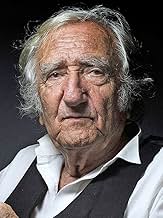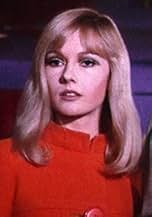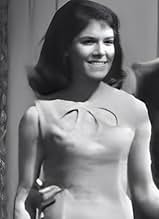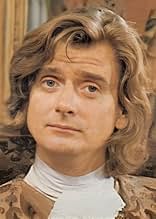VALUTAZIONE IMDb
7,7/10
45.393
LA TUA VALUTAZIONE
Decenni di un triangolo amoroso che riguarda due amici e una donna impulsiva.Decenni di un triangolo amoroso che riguarda due amici e una donna impulsiva.Decenni di un triangolo amoroso che riguarda due amici e una donna impulsiva.
- Nominato ai 2 BAFTA Award
- 3 vittorie e 4 candidature totali
Oskar Werner
- Jules
- (as Oscar Werner)
Serge Rezvani
- Albert
- (as Bassiak)
Michel Subor
- Récitant
- (voce)
- …
Danielle Bassiak
- Compagnon d'Albert
- (non citato nei titoli originali)
Elen Bober
- Mathilde
- (non citato nei titoli originali)
Pierre Fabre
- Ivrogne in Cafe'
- (non citato nei titoli originali)
Dominique Lacarrière
- Une des femmes
- (non citato nei titoli originali)
Bernard Largemains
- Merlin
- (non citato nei titoli originali)
Kate Noelle
- Birgitta
- (non citato nei titoli originali)
Jean-Louis Richard
- Cliente au Cafe'
- (non citato nei titoli originali)
Michel Varesano
- Cliente au Cafe'
- (non citato nei titoli originali)
Christiane Wagner
- Helga
- (non citato nei titoli originali)
Trama
Lo sapevi?
- QuizHenri-Pierre Roché's original novel was based on his own experiences as a young man. The original Catherine was still alive when the film was released and even attended the premiere incognito.
- BlooperWhen Catherine lights the letters on fire, they are at first away from her dress, but in the next shot they are burning on top of her dress.
- Versioni alternativeThe Criterion Region 1 disc and the Tartan Region 2 DVD have a scene in which the film is reversed left/right. When Jules, Jim, and Albert are sitting on the grass sharing stories about the war, the order of the three characters repeatedly changes between shots. This does not occur in other DVD releases of this film, including the Fox/Lorber Region 1 release.
- ConnessioniFeatured in Las dos Elenas (1965)
Recensione in evidenza
The French have a remarkable tendency of creating free-flowing, poetic movies that transport this particular art form into subtle, poignant flights of fancy and nowhere is this more evident than in Jules et Jim, which embodies the beauty of French cinema.
I believe that Truffaut is the most poetic filmmaker in cinematic history. Jules et Jim is his finest moment and, in the ever fluctuating relationships between the Oskar Werner, Henri Serre and Jeanne Moreau characters, we are allowed to be taken along on a refreshing, beatific ride through the passionate simplicity of love and friendship.
The leisurely philosophical musings of the two men in Jules et Jim are counterbalanced by Moreau's bright, airy amorality. She brings about a radicalism and sense of unpredictability in the movie that is nonetheless charming and utterly innocent and benign. Moreau's instinctive will makes her out to be a selfish attention-seeker but without that this movie would not be so surprising and liberating. Truffaut's does not stick to a rigid narrative form, like many '50s and '60s French New Wave directors, and he allows the stream of consciousness dialogue and the ever-changing fortunes of Moreau's erratic relationships with the men to dictate the structure. Jules et Jim has a certain clarity of vision.
French love stories are often based upon dialogue that is rife with throwaway witticisms, perceptive trivial observations, and explosive utterances of love or despair, and Jules et Jim is no different. It can drift along tranquilly until a sudden unexpected change of mood occurs and everything is turned on its head. Moreau's leaping into the river after a civilised night out at the theatre is a delightfully liberating moment, utterly pointless yet still gleefully uninhibited. My finest memory is the heavenly ditty by Moreau which sums up both her and the movie's personality and atmosphere. So simple, so sublime, and always tugging away in the most sumptuous manner at the heartstrings. I don't think I have ever got that tune out of my head.
If you want to experience the sheer majesty of cinema, Jules et Jim just has to be seen. Not only is it bright and breezy but it has tragic moments of pathos as well. There is a surprise at every turn, almost always caused by the Moreau character, and such is the freedom of her spirit and the freedom of the movie's spirit, you can forgive her every action and fickle about-turns. There is no sense of permanence with her. Jules et Jim only confirms my belief that the French make cinema's greatest romances. Utterly natural, hardly ever contrived, and so cool and graceful.
I believe that Truffaut is the most poetic filmmaker in cinematic history. Jules et Jim is his finest moment and, in the ever fluctuating relationships between the Oskar Werner, Henri Serre and Jeanne Moreau characters, we are allowed to be taken along on a refreshing, beatific ride through the passionate simplicity of love and friendship.
The leisurely philosophical musings of the two men in Jules et Jim are counterbalanced by Moreau's bright, airy amorality. She brings about a radicalism and sense of unpredictability in the movie that is nonetheless charming and utterly innocent and benign. Moreau's instinctive will makes her out to be a selfish attention-seeker but without that this movie would not be so surprising and liberating. Truffaut's does not stick to a rigid narrative form, like many '50s and '60s French New Wave directors, and he allows the stream of consciousness dialogue and the ever-changing fortunes of Moreau's erratic relationships with the men to dictate the structure. Jules et Jim has a certain clarity of vision.
French love stories are often based upon dialogue that is rife with throwaway witticisms, perceptive trivial observations, and explosive utterances of love or despair, and Jules et Jim is no different. It can drift along tranquilly until a sudden unexpected change of mood occurs and everything is turned on its head. Moreau's leaping into the river after a civilised night out at the theatre is a delightfully liberating moment, utterly pointless yet still gleefully uninhibited. My finest memory is the heavenly ditty by Moreau which sums up both her and the movie's personality and atmosphere. So simple, so sublime, and always tugging away in the most sumptuous manner at the heartstrings. I don't think I have ever got that tune out of my head.
If you want to experience the sheer majesty of cinema, Jules et Jim just has to be seen. Not only is it bright and breezy but it has tragic moments of pathos as well. There is a surprise at every turn, almost always caused by the Moreau character, and such is the freedom of her spirit and the freedom of the movie's spirit, you can forgive her every action and fickle about-turns. There is no sense of permanence with her. Jules et Jim only confirms my belief that the French make cinema's greatest romances. Utterly natural, hardly ever contrived, and so cool and graceful.
I più visti
Accedi per valutare e creare un elenco di titoli salvati per ottenere consigli personalizzati
- How long is Jules and Jim?Powered by Alexa
Dettagli
- Data di uscita
- Paese di origine
- Lingue
- Celebre anche come
- Jules and Jim
- Luoghi delle riprese
- Aziende produttrici
- Vedi altri crediti dell’azienda su IMDbPro
Botteghino
- Lordo Stati Uniti e Canada
- 509 USD
- Fine settimana di apertura Stati Uniti e Canada
- 11.206 USD
- 25 apr 1999
- Lordo in tutto il mondo
- 487.117 USD
- Tempo di esecuzione1 ora 45 minuti
- Colore
- Mix di suoni
- Proporzioni
- 2.35 : 1
Contribuisci a questa pagina
Suggerisci una modifica o aggiungi i contenuti mancanti

Divario superiore
By what name was Jules e Jim (1962) officially released in India in English?
Rispondi
![Guarda Bande-annonce [OV]](https://m.media-amazon.com/images/M/MV5BMWM5OGI0MjUtZDRhMC00ZGQ1LTk0NWEtMWMzZDFhMjA1OTk1XkEyXkFqcGdeQXRodW1ibmFpbC1pbml0aWFsaXplcg@@._V1_QL75_UX500_CR0)
